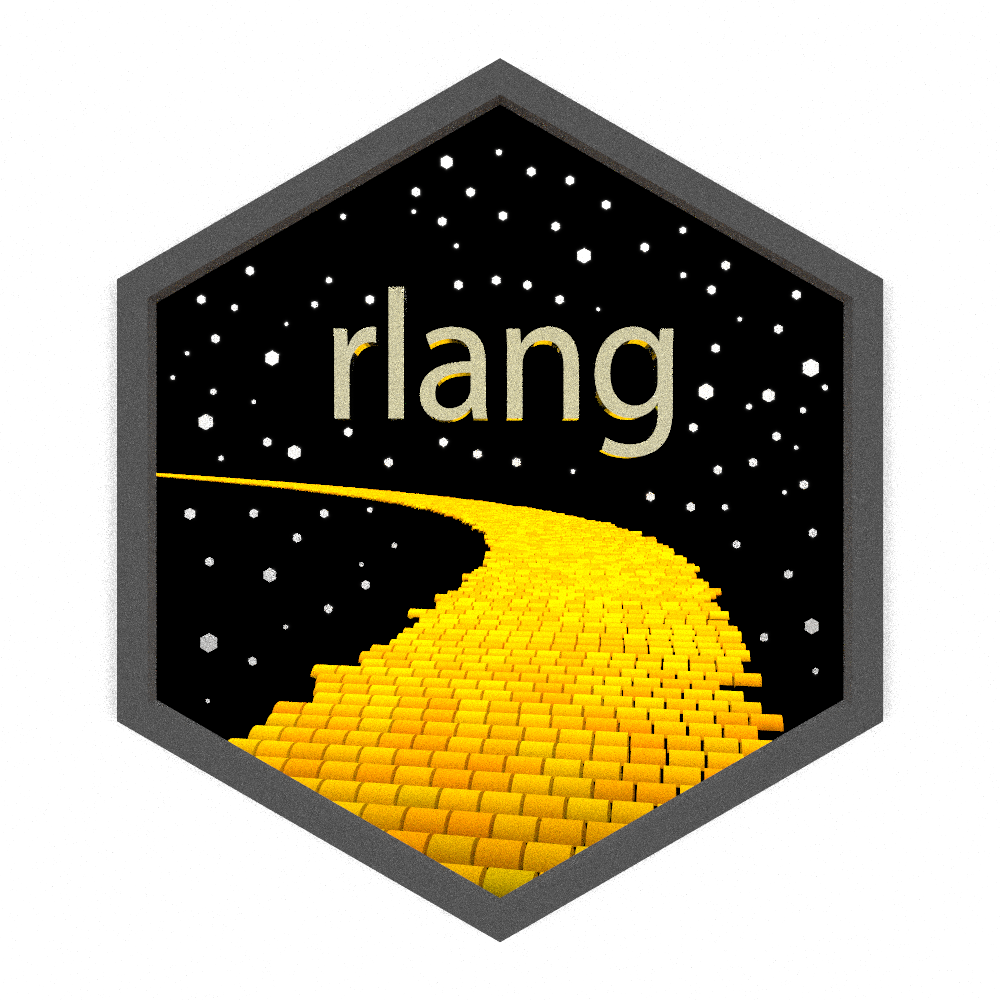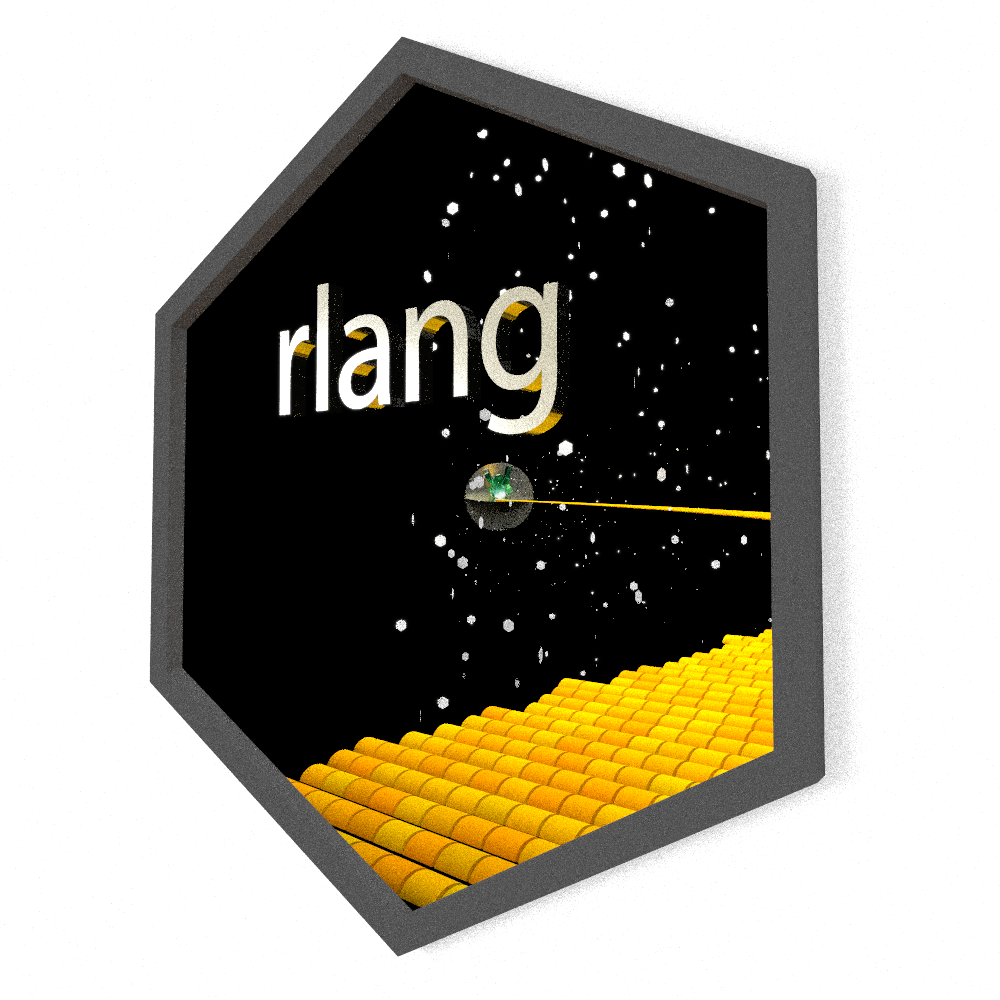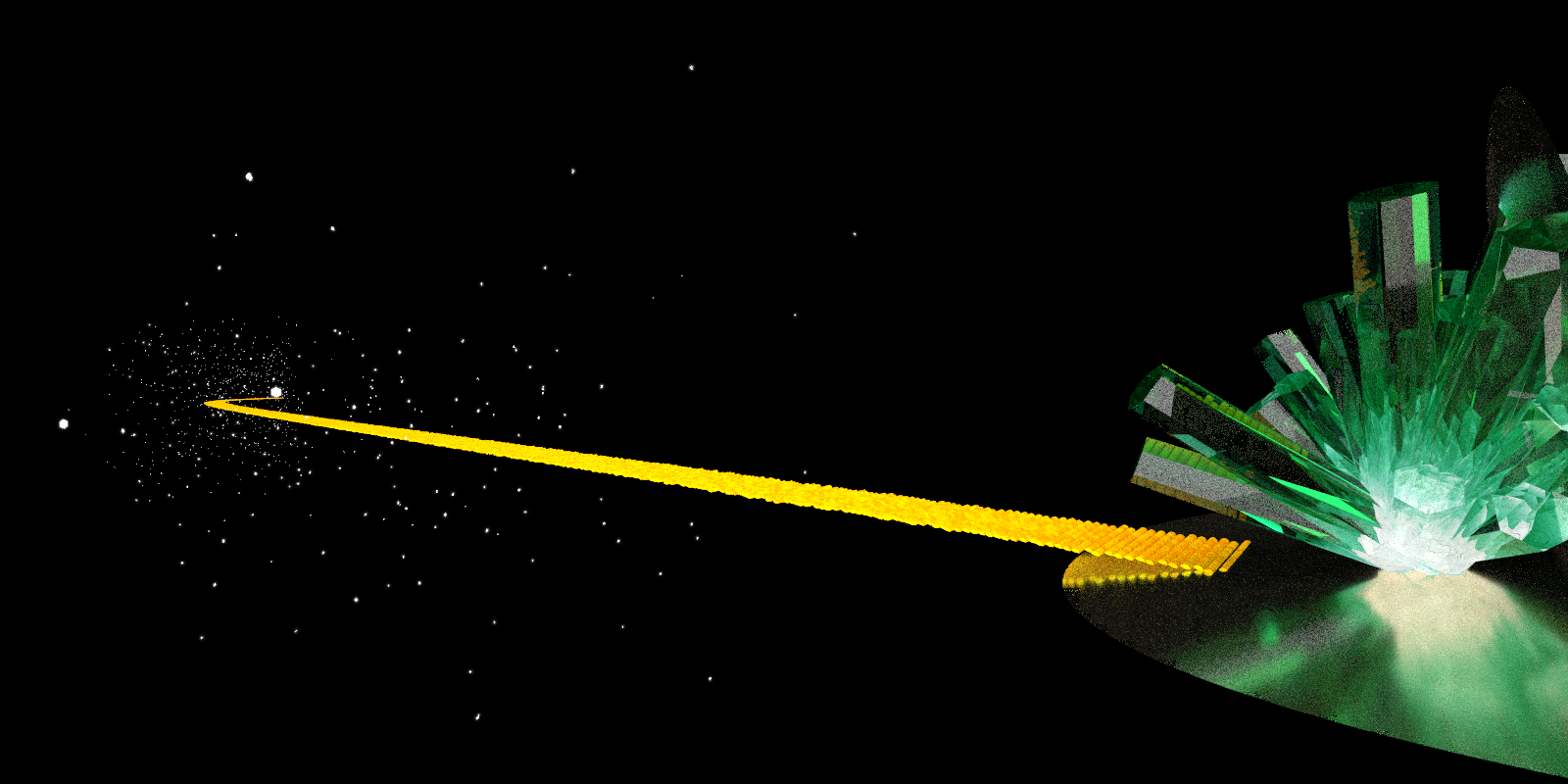Quosures?
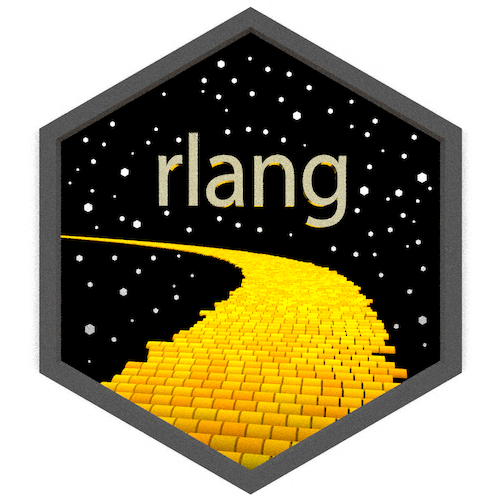
Quosures first showed up on the scene as part of rlang about three years ago
to a collective 🤯. There is good and bad 🤯, and quosures
delivered both in spades. The good: what they do is powerful, and how they do
it at a minimum seems magical. The bad: new terminology and mechanics
confused a lot of people. Since then the developers have devoted substantial
time and effort to make quosures and rlang in general more accessible.
Whether you love or hate rlang, one thing I would hope all but the surliest
amongst us would agree on is that quosures are interesting.
This post is not a tutorial for
rlang, and it is not endorsed by therlangauthors. It is about understanding what quosures are, what makes them interesting, and how they work in the context ofrlang. Quosures started off as a prominent part ofrlang, but have more recently been relegated to something closer to “implementation detail” status. They remain central torlang, but are no longer emphasized in the documentation. Since usage ofrlangin this post is expressly for the purposes of understanding quosures, it deviates from current recommendedrlangpractices1.
Preface: Carriages, Horses, and Damn Philosophers…
Ghosts of Posts Past
If you are unfamiliar with R’s evaluation model, and how it enables “Non-Standard Evaluation” (NSE), now is a good time to check out my previous post on the topic. To understand this post it might help to know what environments, “Enclosures” and “Environment Chains” are, the difference between “Evaluation”, “Calling”, “Function”, and “function Evaluation” Environments, and what unevaluated expressions are and how they are created. All these are discussed at length in that post.
Quasi-quoi?
As we saw previously it is possible to capture unevaluated R expressions with
quote and substitute. We can also manipulate them:
mean_call <- function(expr) {
cmd2 <- quote(mean(NULL)) # create unevaled `mean(NULL)`
cmd2[[2]] <- substitute(expr) # sub in user expression
cmd2
}
(expr <- mean_call(a + b))mean(a + b)mean_call produced the unevaluated expression mean(a + b). We can evaluate
it with eval:
a <- 1
b <- 2
eval(expr)[1] 3The direct manipulation of the expression is a little awkward. Expressions are
recursive lists of sub-expressions, so it can get difficult to keep track of the
exact index to modify. Thankfully R provides bquote to partially quote
expressions (or partially evaluate them, depending on your life outlook - I’m
more of a expression-half-evaluated guy). Let’s look first at a trivial
example:
bquote(mean(.(1 + 2)))mean(3)Compare to:
quote(mean(1 + 2))mean(1 + 2)quote captures the entire expression unevaluated. bquote allows whatever is
inside the .(...) to be evaluated. We can use bquote to recreate
mean_call:
mean_call2 <- function(expr) {
bquote(mean(.(substitute(expr))))
}
mean_call2(a + b)mean(a + b)Wait, but that’s an unevaluated call. Didn’t we promise partial evaluation? We
delivered, but it’s not obvious because what was partially evaluated,
substitute(expr), produced an unevaluated expression! We can see that by
comparing to an implementation that uses quote instead of bquote:
mean_call2a <- function(expr) {
quote(mean(substitute(expr)))
}
mean_call2a(a + b)mean(substitute(expr))mean_call2(a + b)mean(a + b)In this case we can see that quote does not evaluate substitute(expr),
whereas bquote does.
If you were early on the rlang bandwagon you might have seen the term
“quasi-quotation” bandied about. It turns out partial evaluation is
quasi-quotation. It’s just that quasi-quotation was coined by the
philosopher Willard Van Orman Quine, and philosophy without arcaneness is
not philosophy2. Lisp adopted the terminology, rlang brought it
explicitly to R, and the rest of us were left to scratch our heads.
So what’s the etymology of R’s bquote? Turns out that in certain Lisp
dialects such as Scheme the equivalent to the R quote function is a single
quote ', and quasi-quoting (partial evaluation) is done with
the “backquote” `. So R’s quasi-quoting function is named
after the name of the `. I suspect a fair bit of confusion
among R users could have been avoided simply by riffing off of the “backquote”
or (partial) “evaluation” terminology, even though “quasi-quote” is the correct
“formal” term outside of R.
Eat local
One last thing before we get going for real. In order to stress test quosures
and related elements we need to construct interesting Evaluation Environments.
R provides the local function as a mechanism for doing exactly this:
a <- 1
num <- 2
local({
a <- 100
a + num
})[1] 102a + num[1] 3The a defined at the top-level (a <- 1) is masked by the one defined
inside the local Evaluation Environment (a <- 100), but only for expressions
evaluated in that environment. This is akin to how expressions in function
bodies are evaluated in function Evaluation Environments.
We’ll be using local to create interesting ad-hoc evaluation contexts.
About Them Quosures
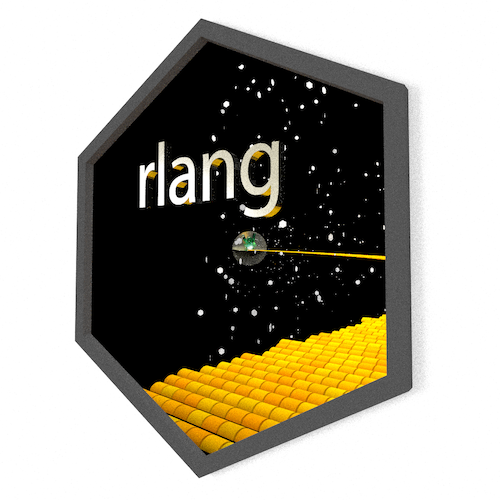
Just as quote, substitute, and bquote do, quosures capture unevaluated
R expressions. We may create them with rlang::quo:
library(rlang)
a <- 1
(qrlang <- quo(a + 1))<quosure>
expr: ^a + 1
env: global
Additionally as you can see above, quosures record the environment the
expression would have been evaluated in, had it not been captured. Unlike
typical unevaluated expressions, quosures do no resolve when they are evaled:
eval(qrlang)<quosure>
expr: ^a + 1
env: global
We’ll see why this is in a little bit, but until then we can use eval_tidy to
evaluate quosures:
eval_tidy(qrlang)[1] 2Things are more interesting with more complex environments. Let’s compare
expressions captured with quote vs quo in an ad-hoc environment created with
local:
a <- 1
lang <- local({
a <- 100
list(
base=quote(a + 1),
rlang=quo(a + 1)
)
})
eval(lang[['base']])[1] 2eval_tidy(lang[['rlang']])[1] 101Normal quoted language resolves a in the environment in which it is
evaled. The quosure instead resolves a in the Evaluation Environment in
which it was created. Pretty neat.
Quosures in Functions
Let’s build a simple NSE function to compute means in the context of of a user-supplied data frame. First with base:
mean_in_data <- function(data, expr) {
expr <- substitute(expr) # capture user expression
expr <- bquote(mean(.(expr))) # wrap it in `mean`
eval(expr, data, parent.frame())
}The key features are substitute, which we discussed in the previous post,
and evaluation in the Calling Environment with parent.frame() to ensure names
used in expr resolve as intended by the user of our function.
We can use it to compute mean engine displacement of mtcars in liters:
l.per.cubic.i <- 2.54^3 / 1000
mean_in_data(mtcars, disp * l.per.cubic.i)[1] 3.78Next with rlang:
mean_in_data_rl <- function(data, expr) {
quosure <- enquo(expr) # capture user expression
quosure <- quo(mean(!!quosure)) # wrap it in `mean`
eval_tidy(quosure, data)
}mean_in_data_rl(mtcars, disp * l.per.cubic.i)[1] 3.78While the parallels between the two implementations are clear when they are
juxtaposed, they are not obvious from the function names alone. The rlang
authors prioritized their own vision of a meta programming interface over
harmonizing with the existing conventions, so we end up with the following
oddities:
rlang::quois used similarly tobase::bquote, but is lexically closer tobase::quote, and at same time gives no indication of its special environment capture abilities in its name.rlang::enquois used similarly tobase::substitute, but bears no relation tobase::enquote. This clash withbase::enquoteis particularly confusing to me given that the “en” gives no indication of howenquois different fromquo(my personal experience was that the lexical similarity betweenquoandenquomade it harder to figure out what was going on).rlangdesignates partial evaluation with!!instead of.()as in base, which is probably the most controversial design decision.
There are reasonable arguments for why things ended up how they
did3. I know the rlang team devoted a lot of time and
effort coming up with names, including trying to work with precedent. But when
I look at the result I can’t help but think the balance of priorities is off.

Partly as a result the initial confusion when rlang was first released the
authors have shifted to different terminology in its documentation and adjusted
the interface somewhat. For example, the “curly-curly” operator was added
replace the quo(!!enquo(arg)) pattern so we could have written instead4:
mean_in_data_rl2 <- function(data, expr) {
quosure <- quo(mean({{expr}})) # notice: no enquo
eval_tidy(quosure, data)
}This is a big improvement given it removes the quo/enquo confusion and
keeps !! out of sight. We stick to the old method because it mirrors the
steps used in base, and it is useful for pedagogical purposes to distinguish
between argument substitution and partial evaluation.
Contemporary
rlangnow also replacesquo()withexpr()5,
While it’s great the rlang team has responded to feedback and tried to adapt
it would have been nice to see a re-convergence towards existing R terminology
rather than toward Standard Seventeen6.
So why bother with rlang, if all I’m going to do is belly-ache about function
names? Well, along with the lexical malpractice (I kid, I kid) we get some very
interesting features.
The Power Of Quosures
Bad NSE implementations often break when some of the names in an expression are not uniquely mapped in the global environment. Let’s try to trigger failures by complicating the Evaluation Environment:
l.per.cubic.i <- 1 # decoy
local({
l.per.cubic.i <- 2.54^3 / 1000 # not global, real duck
list(
base=mean_in_data(mtcars, disp * l.per.cubic.i),
rlang=mean_in_data_rl(mtcars, disp * l.per.cubic.i)
)
})$base
[1] 3.78
$rlang
[1] 3.78A particularly poor implementation might have pulled in the l.per.cubic.i we
added to the global environment, but neither is fooled here. Let’s raise the
stakes a bit:
l.per.cubic.i <- 1 # decoy
local({
mean <- function(x) -base::mean(x) # decoy
l.per.cubic.i <- 2.54^3 / 1000
list(
base=mean_in_data(mtcars, disp * l.per.cubic.i),
rlang=mean_in_data_rl(mtcars, disp * l.per.cubic.i)
)
})$base
[1] -3.78
$rlang
[1] 3.78😱! We find the wrong mean. This would have happened even if we had
defined our function in a package. The very trick that allowed us
to find the correct l.per.cubic.i (eval in parent.frame()) stabbed us in
the back. rlang’s version on the other hand works fine. Ultimately the issue
is that in the expression generated by mean_in_data*:
mean(disp * l.per.cubic.i)We need mean to be resolved
according to the Function Environment, but disp * l.per.cubic.i in the data enclosed by the Calling
Environment. R, however, does not allow more than one Environment Chain at a
time.
With quosures, which retain the Evaluation Environments they are defined in, it
works right out of the box. Of course we can fix the R version by
pre-resolving mean as we did in the prior post, but that’s extra work.
What sorcery allows quosures to evaluate a single expression in multiple
environments, when R itself does not allow it?
Is It Magic?

Let’s peek behind the curtain:
class(quo(a + b))[1] "quosure" "formula"unclass(quo(a + b))~a + b
attr(,".Environment")
<environment: R_GlobalEnv>Quosures are formulas, which we can see both from the class, and also from the
tilde (~), once we side-step the quosure print method. Formulas are an odd
duck in the R world: a form of self-quoting expression that also captures the
Evaluation Environment in which it is created. Mostly they are used to
implement domain specific languages such as model or plot specifications.
Because they can contain arbitrary R expressions as well as environments they
are appealing as a vehicle for quosures.
They do have a big draw-back for our purpose: the quoting is triggered by the
~, but the ~ remains in the captured expression.
~a + b~a + bThis means you cannot evaluate the captured expression as evaluating it just leads to the expression quoting itself again! It’s like those awful trick candles you just can’t blow out:
eval(~a + b)~a + beval_tidy does something quite clever to force evaluation: it replaces ~
with an internal version that self-evaluates quosures. Here is a
hack re-implementation to demonstrate the concept:
eval_tidyish <- function(expr) {
env <- new.env(parent=parent.frame())
env[['~']] <- function(...) {# replace `~` with our version
call <- sys.call()
env <- environment(call) # recover formula env from call
eval(call[[2]], env)
}
eval(expr, env)
}eval_tidyish creates an environment that contains a self-evaluating version of
~, and evaluates the expression therein. We can recover the formula
environment from the call to the formula, which is fortunate as otherwise this
trick would not work. Let’s try it:
a <- 10
q1 <- local({
a <- 1/2
~ a * 2
})
q1~a * 2
<environment: 0x7f9c8795b498>eval_tidyish(q1)[1] 1With more emotion:
q2 <- local({
a <- 1/8
~ a + 1/8
})
bquote(.(q1) / .(q2))(~a * 2)/~a + 1/8eval_tidyish(bquote(.(q1) / .(q2)))[1] 4eval_tidyish(bquote(.(q1) / .(q2) + a))[1] 14Half-assed quosures! These don’t even support adding data to the Environment Chain, deity-forbid using a formula as a formula, and they’ll give you a severe case of operator-precedence-anxiety. But we do bottle that multiple-Environment-Chain magic in a handful of lines of code.
Aside: eval_tidyish will evaluate quosures, albeit with a once-per-session
warning:
eval_tidyish(quo(1 + 2))[1] 3Quosures au Naturel

Formulas seem like a natural fit for quosure-like objects, but they are not.
Their resistance to evaluation forces a custom evaluator along with a additional
logic to preserve non-quosure ~ behavior, which even then remains subtly
affected in corner cases7. There is also the recovery
of the formula environment from the call stack, which works but feels a bit
uncomfortable to me8.
But R doesn’t offer any other functions that hold unevaluated expression and Enclosures, so what are we to do? Cheat, duh.
In the previous post we solved the two Environment Chain dilemma by pre-resolving the function along one Environment Chain and embedding the result in the otherwise unevaluated expression. The key learning is that it is possible to embed non-language objects in expressions. It’s not even really cheating. R does this as it evaluates expressions, evaluating leaves in the expression tree until the tree is fully evaluated and the result is returned.
Which leads us to9:
quote_w <- function(x) {
caller <- parent.frame() # must be outside `bquote`
bquote(with(.(caller), .(substitute(x))))
}quote_w(a + 1)with(<environment>, a + 1)What the hell is that? It’s an unevaluated call to with with an
alive-and-kicking environment embedded as the data argument. That means that
when we evaluate the expression, the provided sub-expression will be evaluated
in the context of that environment. Let’s try it out:
a <- 10
q1 <- local({
a <- 1/2
quote_w(a * 2)
})
q1with(<environment>, a * 2)eval(q1)[1] 1We successfully captured the a <- 1/2 from the local environment, even though
we evaluated the expression in the top-level environment where the mapping is
a <- 10.
Let’s up the difficulty:
q2 <- local({
a <- 1/8
quote_w(a + 1/8)
})
(q3 <- bquote(.(q1) / .(q2)))with(<environment>, a * 2)/with(<environment>, a + 1/8)eval(q3)[1] 4Each of the a’s is resolved in its own environment. We can even mix them
with normal unevaluated expressions. The names outside of the withs resolve
in the Evaluation Environment:
(q4 <- bquote(.(q1) / .(q2) + a))with(<environment>, a * 2)/with(<environment>, a + 1/8) + aeval(q4)[1] 14Why bother with this madness when we have quosures already? Well, it’s fun.
And the with approach has benefits:
- We can use good-old
base::eval. - Semantics are pure; everything behaves exactly as usual in the R interpreter.
- Complete interoperability with existing meta-programming constructs (e.g.
bquote). - WYSIWYG: the semantics of the expressions are transparent. Any useR familiar
with
withknows what the expressions will do. Sure, they don’t necessarily know what’s in the environments, but that’s true of quosures too. - WYSIWYG 2: We don’t need any special print methods, and operator precedence is crystal-clear.
All of this in two lines of code! It does say something about the baked in meta-programming capabilities of R that such thing is even possible.
Yes, some will object to the aesthetics of the with calls everywhere,
preferring the more demure ^ prefix, but the latter relies on custom print
methods. We could add the same, but they are defeated by things such as:
q5 <- quo(a + 1)
rlang::expr(a + !!q5)a + ~a + 1Of course, we’re not even close to replacing the full functionality of quosures with this, but it’s not a bad start.
Bells, Whistles
Substitute
We need a counterpart to substitute that will capture the Calling Environment
like enquo does:
substitute_w <- function(x) {
caller <- parent.frame()
caller2 <- sys.frame(sys.parent(2)) # see appendix for explanation
expr <- eval(bquote(substitute(.(substitute(x)),.(caller))))
expr <- eval(bquote(.(bquote)(.(expr))), caller2)
bquote(with(.(caller2), .(expr)))
}There is some not-so-great 🤯 going on in there, but we’ll sweep that
under the “implementation details” rug. The users of substitute_w need not
be concerned with them. Check the appendix if you want an
explanation. Part of the complexity stems from supports
of backquoting (a.k.a. quasi-quotation / partial-evaluation). And
despite this feature there are still only five lines of code in it.
One problem with this implementation is that it might not get the correct
environment for any dots (...) that are in the argument to substitute_w
(e.g. as with substitute_w(list(...))). This is because substitute will
replace dots recursively, unlike with other names. Each element of the dots
once expanded may be associated with different environments on the call
stack. A more thorough implementation would warn/error if it encountered any
dots.
The ability to associate environments to arguments forwarded via dots is a
distinguishing feature of rlang that likely cannot be replicated efficiently
with base R.
Back-quoting
Since we implemented substitute_w with partial-evaluation support we don’t
need a bquote_w for our purposes here, though there is an implementation in
the appendix.
Masking
One of the most common uses of NSE is to allow user data to “mask” names in the Evaluation Chain. This is typically done by turning the data into an environment with the previous Evaluation Chain as the Enclosure, and evaluating expressions therein. So let’s do just that:
mask <- function(expr, data) {
if(is.language(expr) && length(expr) > 1L) {
# modify `with` expressions that contain a live environment
if(expr[[1L]] == as.name('with') && is.environment(expr[[2L]])) {
expr[[2L]] <- list2env(data, parent=expr[[2L]])
}
# recurse on each sub-expression
expr[2L:length(expr)] <- lapply(expr[2L:length(expr)], mask, data)
}
expr
}R expressions are nested lists of sub-expressions, and our quoted with
statements are unevaluated R expressions. Most of the function recurses
through those lists. The key line is:
expr[[2L]] <- list2env(data, parent=expr[[2L]])There we use the existing environment as the Enclosure to the data mask, and then we swap the data mask in10. Let’s try it:
q6 <- local({
a <- 1/2
quote_w(a + b + 2)
})
b <- 1
eval(q6)[1] 3.5q7 <- mask(q6, list(b=10))
eval(q7)[1] 12.5Endgame
Now we can go back to our mean_in_data* functions:
mean_in_data_w <- function(data, expr) {
expr <- bquote(mean(.(substitute_w(expr))))
expr <- mask(expr, data)
eval(expr)
}l.per.cubic.i <- 1 # decoy
local({
mean <- function(x) -base::mean(x) # decoy
l.per.cubic.i <- 2.54^3 / 1000
list(
base=mean_in_data(mtcars, disp * l.per.cubic.i),
rlang=mean_in_data_rl(mtcars, disp * l.per.cubic.i),
base_w=mean_in_data_w(mtcars, disp * l.per.cubic.i)
)
})$base
[1] -3.78
$rlang
[1] 3.78
$base_w
[1] 3.78Beauty.
Notice we use bquote to generate the mean call. This is safe to do because
we evaluate expr in the same environment that call is created so we do not
need to capture the local environment11.
Finally, for good measure, we’ll wrap all our functions inside another function to demonstrate argument forwarding.
mean_in_data_all <- function(data, expr) {
l.per.cubic.i <- 1 # decoy
mean <- function(x) -base::mean(x) # decoy
list(
base=eval(bquote(mean_in_data(data, .(substitute(expr))))),
rlang=mean_in_data_rl(data, !!rlang::enquo(expr)),
base_w=mean_in_data_w(data, .(substitute_w(expr)))
)
}If you look closely you’ll notice that the base approach requires us to capture
the user expression and forward it on by using
eval(bquote(.(substitute(expr)))). On the other hand, for both the _rl and
_w versions we can rely on the functions to do the partial evaluation of their
arguments directly.
In and of itself once you’re comfortable with “programming on the language” this is only a slight annoyance, but the result is wrong:
l.per.cubic.i <- 2.54^3 / 1000
mean_in_data_all(mtcars, disp * l.per.cubic.i)$base
[1] -231
$rlang
[1] 3.78
$base_w
[1] 3.78The naive implementation picks up both the decoy mean and l.per.cubic.i.
This is a variation on the issue we had previously, in which we need different
parts of the composite expression evaluated in different environments. With a
little extra work, we can resolve this too, but it is nice we can build tools
that handle the complexity for us.
Equivalently for the
rlangoption we could have donemean_in_data_rl(data, {{expr}})
Conclusions
This post is a side-effect of my trying to understand quosures in detail. The base R versions are intended as self-confirmation that indeed, I more or less get the concepts, at least enough to implement variations with (pun-intended) useful properties. I have no intention of publishing a meta programming package with quosure-like functionality. If you are tempted to use the code herein for your purposes, be aware that the testing I did is incomplete and the code has not been used outside of this post12.
Does this mean I endorse rlang for meta-programming purposes? There are
interesting and useful features therein, the overall quality of the package is
excellent, and it has no run-time dependencies. One important feature that
likely cannot be implemented efficiently in base R is enquos due to
dots (...) potentially resolving to multiple environments. Situations with
extensive meta-programming involving ... argument forwarding will benefit most
from rlang.
My main reservation is the philosophy underlying the API which in my view
prioritizes an internal aesthetic at the expense of harmony with the existing
meta-programming facilities. Additionally, while the existing facilities are
not perfect, they are still excellent, so I’m ambivalent about the feature /
complexity trade off that come with rlang.
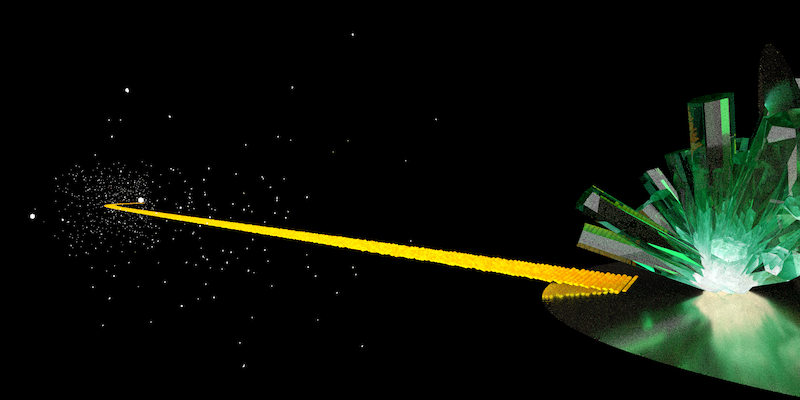
Questions, comments, or just want to share this post? Post about it on Twitter. Follow @brodiegaslam for updates and/or new post notifications.
Appendix
Acknowledgments
I’d like to thank Lionel Henry for all the work he’s done developing and
implementing his ideas on meta-programming in R, and for being so gracious in
discussing them with me and providing feedback on this post, particularly given
that he knows I harbor somewhat adversarial views. I’ve learned a lot from
looking at his code and from getting his perspectives on potential alternative
implementations of some of the rlang concepts.
Additionally:
- R-core for creating and maintaining a language so wonderful it allows crazy things like computing on the language.
- Lionel Henry and Hadley Wickham for
rlang. - For the illustrations:
- Tyler Morgan Wall for
rayrenderwhich I used to render the illustrations - Paul Murrell for
gridBezierwhich I used to turn the SVG into a polygon outline. - Michael Sumner for
decidowhich I used to triangulate some of the shapes in the scenes. - Daniel Adler, Duncan Murdoch, etal. for
rglwith which I mocked up the scenes. - Simon Urbanek for the PNG package which I used while post-processing many of the images in this post.
- The yellow brick road scene is based on the official
rlangSVG logo, which is licensed CC0.
- Tyler Morgan Wall for
- Dirk Eddelbuettel for copy edits.
References
- TidyEval Bookdown.
- UseR 2017 Tidy Evaluation presentation.
- DSC 2017 Tidy Evaluation (Hygenic Fexprs).
- Macro Substitution in R.
- Advanced R Chapter on Evaluation.
- Programming
dplyrvignette. - The previous post in this series on NSE.
Updates
- 2020-08-11: typo fixes.
Implementation Details
quote_w
bquote uses eval internally to partially evaluate the sub-expressions
enclosed in .(...), which will cause parent.frame to behave in unexpected
ways. More details in the substitute_w section.
bquote_w
This is not strictly needed for our purposes, but I implemented originally when
I intended for it to accept an env parameter, and use that combined with
substitute instead of implementing substitute_w. I leave it here for
completeness.
a <- 10
q5 <- local({
q <- bquote_w(a + .(a))
a <- 1/2 # assign to `a` AFTER bquote_w!
q
})
q5with(<environment>, a + 10)eval(q5)[1] 10.5We need to assign to a in local after the call to bquote_w as otherwise the
partially evaluated a would be the local a and not the global one.
The implementation is tricky:
bquote_w <- function(x) {
caller <- parent.frame()
expr <- eval(bquote(.(bquote)(.(substitute(x)))), caller)
bquote(with(.(caller), .(expr)))
}We’ll use the following use-case to illustrate how the function works:
a <- b <- 2
expr <- local({
a <- 1
bquote_w(a + .(b))
})
expr
eval(expr)And we’ll spread bquote_w over more lines so that we may better annotate it:
bquote_w <- function(x) { caller <- parent.frame()
# Capture user expression
expr <- substitute(x) # expr == a + .(b)
# Wrap the expression in `bquote`, using `bquote`. We in-line `bquote`
# so in reality if you examined `expr` below you would see the entire
# `bquote` function definition crammed into the first element of
# the expression. This is necessary to avoid interference with a user
# defined `bquote`.
expr <- bquote(.(bquote)(.(expr))) # expr == (<bquote>)(a + .(b))
# Evaluate the `bquote` expression we created, in the calling frame so
# that the elements that need to be partially evaluated are
expr <- eval(expr, caller) # expr == a + 2
# Generate the quoted with
bquote(with(.(caller), .(expr))) # with(<caller>, a + 2)
}substitute_w
We’ll use the following expression to illustrate the annotated version of
substitute_w:
a <- b <- 2
f <- function(x) substitute_w(x)
expr <- local({
a <- 1
f(a + .(b))
})
exprwith(<environment>, a + 2)eval(expr)[1] 3substitute_w <- function(x) {
# capture environments, we need the Calling Environment, and the
# Calling Environment of the Calling Environment
caller <- parent.frame()
caller2 <- sys.frame(sys.parent(2))
# Capture the user expression by running substitute in the caller
# frame. We inline the substitute function diretly into the
# expression to avoid conflicts with a possible user-defined
# `substitute`
expr <- substitute(x) # x
expr <- bquote(.(substitute)(.(expr))) # (<substitute>)(x)
expr <- eval(expr, caller) # a + .(b)
# Do the partial evaluation in the caller of the caller, see the
# bquote_w breakdown above for details
expr <- bquote(.(bquote)(.(expr))) # (<bquote>)(a + .(b))
expr <- eval(expr, caller2) # a + 2
bquote(with(.(caller2), .(expr))) # with(<caller2>, a + 2)
}Using parent.frame and similar in functions that are invoked with NSE is
tricky. In particular, parent.frame(2) will not work as expected if
substitute_w is invoked by eval, as would happen in e.g.
bquote(.(substitute_w(x))). So to ensure everything works correctly we use
sys.frame(sys.parent(2)), which despite what the documentation claims (as of
R4.0), has different semantics to parent.frame which allows it to find
the intended frame. You also need to be careful about using
sys.frame(sys.parent(1)) directly in an eval call (or inside the
.(...) of a bquote).
Session Info
sessionInfo()R version 4.0.2 (2020-06-22)
Platform: x86_64-apple-darwin17.0 (64-bit)
Running under: macOS Mojave 10.14.6
Matrix products: default
BLAS: /Library/Frameworks/R.framework/Versions/4.0/Resources/lib/libRblas.dylib
LAPACK: /Library/Frameworks/R.framework/Versions/4.0/Resources/lib/libRlapack.dylib
locale:
[1] en_US.UTF-8/en_US.UTF-8/en_US.UTF-8/C/en_US.UTF-8/en_US.UTF-8
attached base packages:
[1] stats graphics grDevices utils datasets methods base
loaded via a namespace (and not attached):
[1] Rcpp_1.0.4.6 bookdown_0.18 digest_0.6.25 later_1.0.0
[5] mime_0.9 R6_2.4.1 jsonlite_1.6.1 magrittr_1.5
[9] evaluate_0.14 blogdown_0.18 stringi_1.4.6 rlang_0.4.7
[13] rstudioapi_0.11 promises_1.1.0 rmarkdown_2.1 tools_4.0.2
[17] servr_0.16 stringr_1.4.0 httpuv_1.5.2 xfun_0.13
[21] compiler_4.0.2 htmltools_0.4.0 knitr_1.28 At the time of this writing the
rlangauthors suggest the programming withdplyrvignette for contemporaryrlang/ tidy-eval usage.↩Oh no, I bear no resentment whatsoever to philosopher’s whose works were required readings for me back in the day.↩
I actually like the name “quosure”, and I understand the desire to contract it to
quo. However this contraction drops the semantically distinguishing part of the name asquocould just as easily be short forquote.enquois a nice aesthetic variation onquo, but as noted previously it gives me no hint as to what it does. In an of itself that’s not terrible, except that there isbase::enquote, which in contrast behaves as per its name. Then there is!!, which is therlangcounterpart tobquote’s.(). I understand the reasons for wanting something like!!: visually distinct to indicate that partial evaluation is done at quoting time, and not during final evaluation of the expression. Technically the distinction is there, but!!doesn’t convey that on its own. You have to read the documentation to know that. It is also a very fine distinction that will not matter in most cases, and more importantly, one that!!cannot convey alone. Since we must read the docs to know the semantics of!!, whether it isUQor!!or.()becomes an aesthetic rather than semantic consideration. So why not.()asbquoteuses? It is true that third party packages use it, but I don’t buy into the concept that just because a third party overloads a base R idiom that idiom is polluted and should not be used in its original sense. So while I see some value in wanting to indicate that something is different about the partial-evaluation action, it seems a secondary consideration on its face, and of even lesser one given that.()provides that distinction too. On one hand we have what I see as a minimal value-add, and on the other some real concerns:!!overloads an existing operator in an unusual way, requires alternate parsing to simulate a single symbol when there are two (strictly speaking the parsed expression is re-arranged via meta-programming, but the effect of that is the same as changing the parser rules), adds operator precedence ambiguity, creates a new idiom when there is an existing one in the base language, and granted with the benefit of hindsight, we can say has been the source of much confusion and consternation. Most of the concerns I raise here could be swept under the rug with the “those are rarely used components of the base R API anyway” argument, but I don’t think third parties should unilaterally decide what portions of the API are okay to shoulder aside. Why do I care? Why not just live and let live? Because I think it is better for the health of a language to avoid fragmentation, and I hope I can convince some to agree. It’s easier to collaborate if we all share the same foundations, and it seems natural to me that the lingua franca should revolve around R itself, not third party extensions. Obviously this is just my opinion. CRAN, which is notorious for having strict standards for accepting third party packages imposes no requirements on overloading base functions, let alone lexical semantics, so there is nothing technically wrong with doing those things. Lionel was gracious enough to discuss some of these issues with me, and I tried to reflect some of his arguments in this footnote, although I am presenting them as someone with a dog in the fight, so take all this with a grain of salt.↩In version 0.4.0 ~June 2019.↩
In cases like this one there is no value to capturing the local environment as that is the one
eval_tidywill default to anyway. It is now expected thatquoshould rarely if ever be used. See the programming withdplyrvignette.↩This is not entirely fair: for example what used to be called “overscope” became “mask”, the latter a term base R uses. There may be other examples. On the other hand there is now the use of “defuse” and similar to reference quoting. While those terms are evocative and as such have some value, I still think it would be better to just focus on the existing terminology in the language.↩
It is not possible to reference a custom, non-quosure tilde defined as part of a quosure’s Environment Chain.↩
I don’t think it is documented that the attributes of a call that was evaluated will be put along with the call onto the call stack. Maybe there is some implicit guarantee that this will always be the case. I wouldn’t have been surprised if only the actual call was put on the stack, or as part of some optimization that became the case in the future.↩
bquoteuseseval, which sets two evaluation contexts in a way that causesparent.frame()to behave in unpredictable ways. To avoid issues it is better to callparent.frame()outside ofbquote.↩This masking is not quite the same as what
rlangdoes as there the same mask environment is re-used for every quosure.↩This is the reason why
rlangnow encourages the use ofexproverquo. It is rare to need to capture a local environment because in most cases where there are multiple environments in play, they can be captured withenquo(s)or{{}}.↩I tested the cases in the post, a few variations, and some of the
rlangtests that seemed relevant.↩
